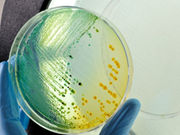Addition of EDTA, PHMB increased the antimicrobial effect in all strains except P. aeruginosa ATCC6538
FRIDAY, Nov. 11, 2016 (HealthDay News) — Protamine has a dose-dependent antimicrobial effect, according to a study published in the November issue of Optometry and Vision Science.
Mahesh K. Bandara, Ph.D., from the University of New South Wales in Sydney, and colleagues examined the ability of protamine to kill bacteria and fungi associated with contact lens-related keratitis. The antimicrobial activity of solutions of protamine with and without polyhexamethylene biguanide (PHMB) and ethylenediamine tetra-acetic acid (EDTA) was tested using the International Organization for Standardization (ISO) for contact lens care solutions; the recommended ISO panel of microbes was tested along with six clinical isolates. The authors also assessed the effect of increasing sodium chloride concentration on the antimicrobial activity and the cytotoxicity of the final solution.
The researchers found that protamine had a dose-dependent antimicrobial effect; for most strains, the highest effect was at 228 µM. For all strains except Pseudomonas aeruginosa ATCC6538, addition of EDTA and PHMB increased the antimicrobial effect. For all microbes, optimum antimicrobial activity was achieved in 0.2 percent sodium chloride, but the activity met or exceeded the ISO standard even in 0.8 percent sodium chloride. There was no cytotoxicity to mammalian cells for any of the formulations.
“This study highlights the potential for protamine to be used for the development of effective multipurpose disinfection solutions,” the authors write. “Further investigations such as stability, compatibility with contact lenses, and in vivo toxicity are warranted.”
Full Text
Copyright © 2016 HealthDay. All rights reserved.








